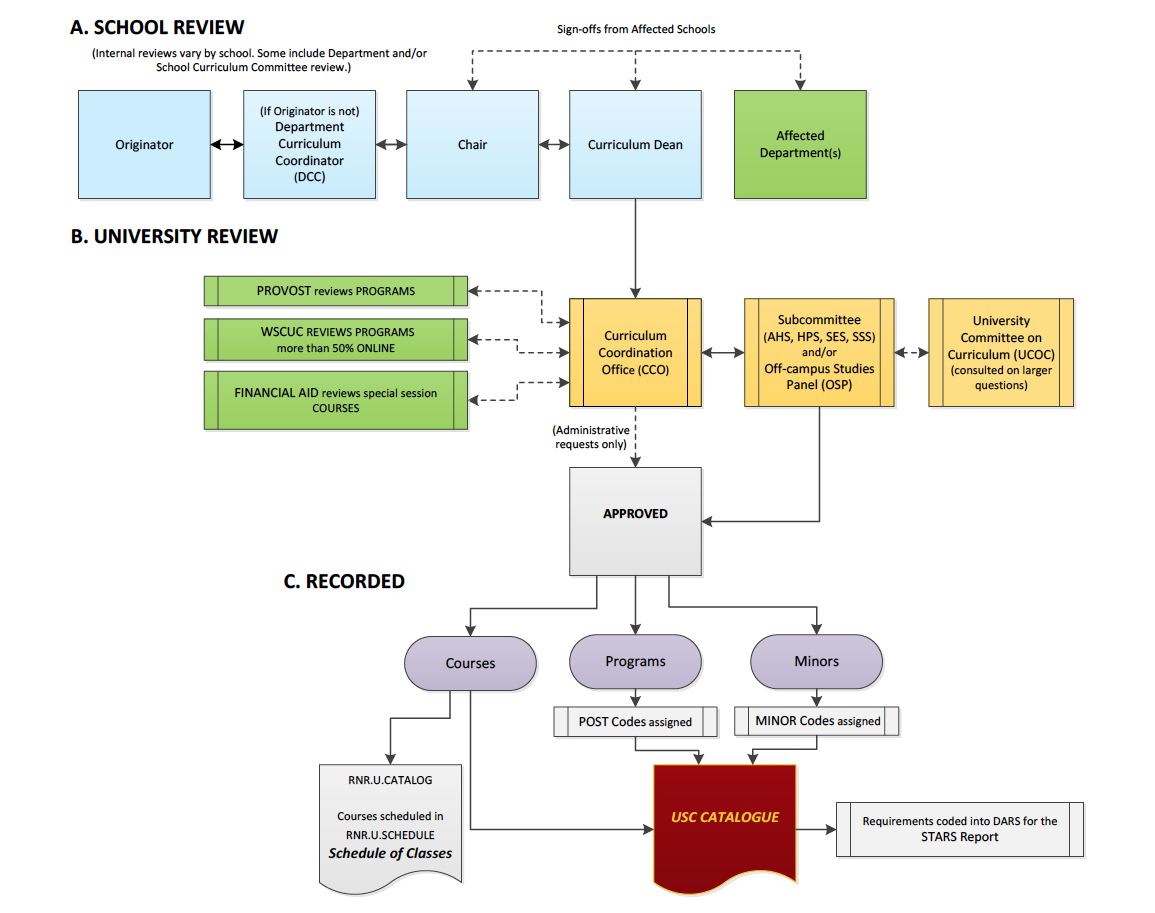Review Process

A. SCHOOL REVIEW
Please note:- Internal reviews vary by school. Some include Department and/or School Curriculum Committee review.
- Originator is any person with access to USC's CurriculogTM who wishes to submit a proposal.
- Department Curriculum Coordinator (DCC) submits and guides the proposal through the review process and is responsible for tracking the progress of proposals. They are responsible for identifying any departments potentially affected by the proposal and making sure they are notified. The DCC coordinates any discussion required for the proposal and ensures required documentation (for instance, syllabi for courses) is attached.
- Chair reviews the proposal, consults with affected units, and makes any additional edits, according to the department’s intention.
- Curriculum Dean reviews the proposal and suggests any additional edits, according to the school's mission.
B. UNIVERSITY REVIEW
- Curriculum Coordination Office (CCO) Review
- Administrative actions are approved by the CCO.
Administrative actions include: a minor revision to course title or course description, the addition/removal of prerequisites/co-requisites/concurrent enrollment/recommended preparation/cross-listing/registration or credit restrictions from a course, and the addition or removal of elective (non-required) courses, from programs/minors/certificates not affecting total units required. No syllabus is needed for a course administrative action.
- If a proposal is technically accurate and requires content review, the proposal is forwarded to subcommittee review.
- New programs are routed for Provost Office acknowledgment, including review by the Vice President for Enrollment Management, before being routed forward to subcommittee review
- Subcommittee Review
- The subcommittee chair (with or without additional subcommittee member review) reviews proposal content. Subcommittee approval means that a proposal is approved at the University level.
- o The Off-campus Studies Panel (OSP) reviews courses and programsthat take place for any length of time overseas or a semester or more off-campus domestically.
- University Committee on Curriculum (UCOC)
- Proposals that pose larger questions and require greater input as they deal with university policy and procedures with regard to curriculum are brought before the UCOC.
- UCOC meets on the first Wednesday of every month between September and May.
- Financial Aid Considerations
Financial Aid reviews fall and spring semester course proposals that do not span fifteen weeks of instruction, with a final summative experience on the University-scheduled final exam day and time. Financial Aid also reviews programs that will be offered 50% or more at locations other than University Park Campus and Health Sciences Campus. Contact Megan Chan for more information. -
WSCUC Approval for Online Programs
Programs (not graduate certificates) that are more than 50 % online must obtain WSCUC approval after UCOC subcommittee approval. Contact Robin Romans as you start the proposal and after it is approved by UCOC. - Advertisement
ALL curriculum proposals MUST be approved by UCOC subcommittee before they are advertised. ALL programs that are more than 50% online must obtain WSCUC approval BEFORE they are advertised by schools or departments.
- Please note:
C. RECORDED
- POST and Minor Codes are assigned to approved programs, certificates and minors by the Registrar's Office.
- Catalogue Entry
- Program, minor and course proposals approved by UCOC subcommittee are imported into the production USC Catalogue throughout the curriculum season, September-May.
- Departments should preview the upcoming academic year in the Production Catalogue to ensure that curriculum has been updated as it was submitted and approved via CurriculogTM.
- Recording of Approved Curriculum
- Courses are archived in RNR.D.CATALOG on the Student Information System (SIS). Any active course in CATALOG may be scheduled by the owning department via the SIS process, RNR.U.SCHEDULE. Scheduled courses display in the Schedule of Classes, classes.usc.edu. Additional scheduling procedures and details can be found at Section Scheduling at USC.
- Programs are encoded into the Degree Audit Reporting System (DARS) by Degree Progress to create or update the STARS Report.



